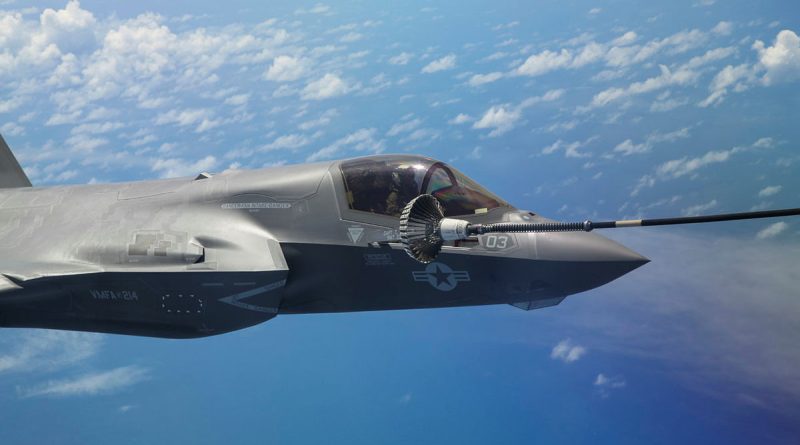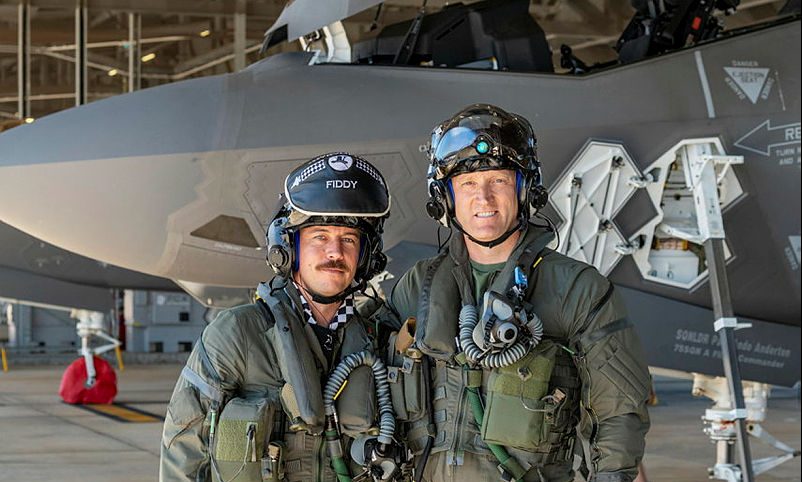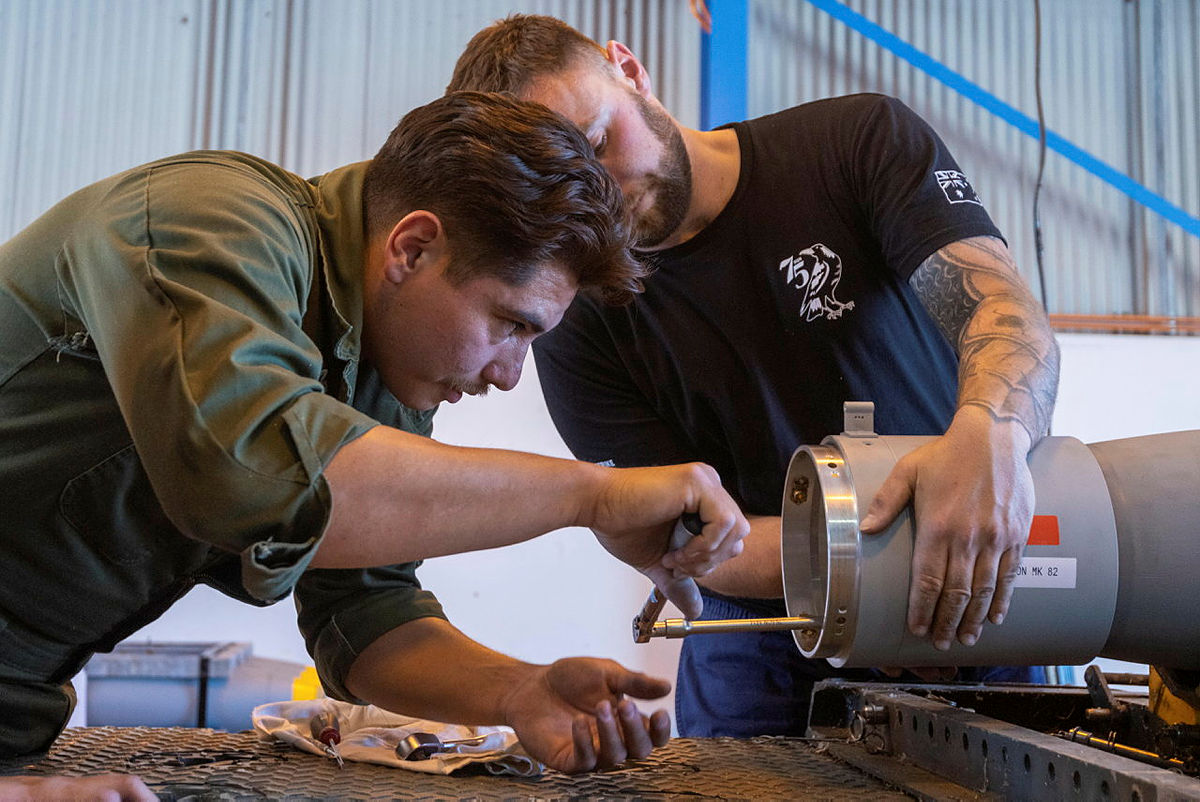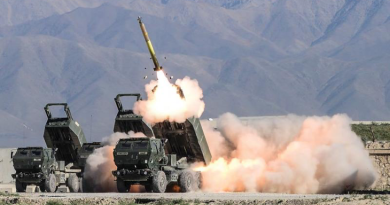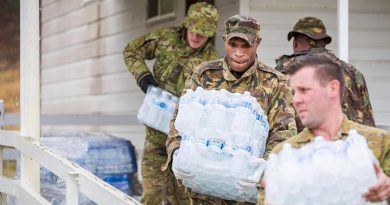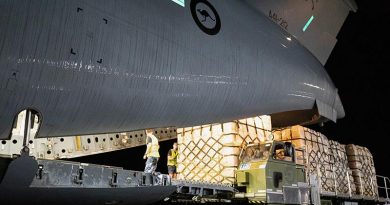RAAF and USMC F-35s train together in NT

The skies over the Northern Territory came alive with different variants of the F-35 Lightning II in May and June [reported in July], with aircraft from RAAF and the US Marine Corps (USMC) training together for Exercise Magpie Lightning.
CAPTION: A US Marine Corps F-35B Lightning II from Marine Fighter Attack Squadron 214 is refuelled by a RAAF 33 Squadron KC-30A Multi Role Tanker Transport aircraft over the Pacific ocean in transit to Australia. Story by Flight Lieutenant Greg Hinks. USMC photo by Corporal Nicholas Johnson.
Magpie Lightning involved more than 200 marines from the USMC ‘Black Sheep’ – Marine Fighter Attack Squadron 214 (VMFA-214) – flying F-35B Lightning II aircraft to RAAF Base Tindal to work alongside RAAF F-35A Lightning II crews from 3 Squadron and 75 Squadron.
The exercise showed how both forces can seamlessly integrate by sharing aircraft and air and ground crews.
Fast-jet pilots from USMC took the controls of RAAF F-35A Lightning II aircraft, conducting training in offensive counter air, defensive counter air, suppression of enemy air defences, and strike mission sets during day and at night.
CAPTION: Commanding Officer 75 Squadron Wing Commander Andrew Nilson, left, and Commanding Officer US Marine Corps Marine Fighter Attack Squadron 214 Lieutenant Colonel Robert F. Guyette before a formation flight.
Commanding Officer 75 Squadron Wing Commander Andrew Nilson demonstrated the depth of interchangeability between RAAF and USMC by joining his counterpart from VMFA-214, Lieutenant Colonel Robert F. Guyette, in a formation flight.
“The most impressive aspect of the exercise has been the depth of interoperability and interchangeability between our two nations,” Wing Commander Nilson said.
“RAAF and USMC crews have conducted cross-platform maintenance work and the aircrew have conducted complex training sorties using the most contemporary shared tactics in mixed RAAF and USMC formations of F-35A and F-35B aircraft.
“It was a further demonstration of our interoperability that USMC pilots were able to fly RAAF F-35A aircraft during the exercise, allowing the RAAF to share and learn tactics, techniques and procedures at a level of complexity that has truly tested the F-35 capability.
“The exercise also demonstrated interchangeability of some of our weapons with USMC F-35B aircraft loading, carrying and employing Australian prepared and owned air-to-surface munitions.”
Lieutenant Colonel Guyette echoed these sentiments.
“What we are seeing here is the RAAF and the Marine Corps moving past interoperability and on towards interchangeability,” Lieutenant Colonel Guyette said.
“Interoperability is two different organisations figuring out ways to work together, while interchangeability means the entire Allied F-35 force can pool parts, maintainers, weapons, tactics, and now pilots and aircraft, to accomplish any mission, anywhere, side-by-side with who and what we have on hand.
“We still have many opportunities to tie-in even closer, but these flights clearly demonstrate that there is no limit to the level of interchangeability we can achieve.”
CAPTION: Armament fitters from RAAF’s 75 Squadron and US Marine Corps Marine Fighter Attack Squadron 214 work together during Exercise Magpie Lightning. Story by Flight Lieutenant Greg Hinks. Photos by Sergeant Hayden Young.
The integration between the forces began well before VMFA-214 arrived in Australia for Exercise Magpie Lightning, when a 33 Squadron KC-30A multi role tanker transport from RAAF Base Amberley supported USMC’s Guam to Tindal portion of the trip.
33 Squadron provided aerial refuelling for two USMC F-35B Lightning II aircraft, travelling days after the first USMC aircraft departed due to the scheduled US tanker becoming unavailable.
Operations Officer VMFA-214 USMC Major John-Paul Reyes was impressed by the seamless cooperation between RAAF and USMC in getting the aircraft to Australia.
“When US refuelling capability was challenged and the Tanker Airlift Control Centre couldn’t get us to the finish line, the RAAF stepped up and got us there,” Major Reyes said.
“Coordination with RAAF HQ Air Command, RAAF Air Mobility Control Centre and 33 Squadron was seamless.
“Communication and connecting through different points of contacts was quick and exceeded expectations.
“It was clear they were all in to support the US.
“They prioritised our mission and understood the importance of US F-35Bs arriving in Australia to support follow-on tasking.”
It was equally important for Flying Officer Lachlan O’Brien, KC-30A co-pilot for the mission.
“It is an awesome opportunity to engage and develop further experience with the United States Marine Corps personnel and their F-35Bs, particularly for long-range air-to-air refuelling exposure,” Flying Officer O’Brien said.
This was the first iteration of Exercise Magpie Lightning involving aviators and aircraft from RAAF’s 3 Squadron and 75 Squadron, and VMFA-214 USMC.
.
.

.
.

